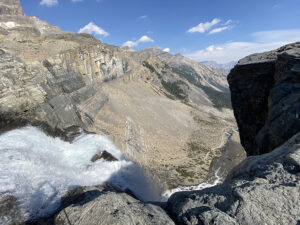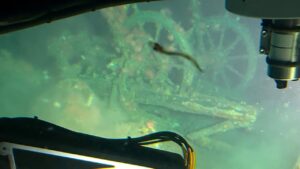Shackleton and his team abandoned the ship and spent their first night and day on the ice.
At midnight, Ernest Shackleton was pacing the ice, listening to the grinding floe and to the groans and crashes that told of the death-agony of the Endurance, when he noticed suddenly a crack running across our floe right through the camp. The alarm-whistle brought all hands tumbling out, and they moved the tents and stores lying on what was now the smaller portion of the floe to the larger portion.
Morning came in chill and cheerless, he writes in his book, “South!”…
All hands were stiff and weary after their first disturbed night on the floe. Just at daybreak I went over to the Endurance with Wild and Hurley, in order to retrieve some tins of petrol that could be used to boil up milk for the rest of the men. The ship presented a painful spectacle of chaos and wreck. The jib-boom and bowsprit had snapped off during the night and now lay at right angles to the ship, with the chains, martingale, and bob-stay dragging them as the vessel quivered and moved in the grinding pack. The ice had driven over the forecastle and she was well down by the head. We secured two tins of petrol with some difficulty, and postponed the further examination of the ship until after breakfast. Jumping across cracks with the tins, we soon reached camp, and built a fireplace out of the triangular water-tight tanks we had ripped from the lifeboat. This we had done in order to make more room. Then we pierced a petrol-tin in half a dozen places with an ice-axe and set fire to it. The petrol blazed fiercely under the five-gallon drum we used as a cooker, and the hot milk was ready in quick time. Then we three ministering angels went round the tents with the life-giving drink, and were surprised and a trifle chagrined at the matter-of-fact manner in which some of the men accepted this contribution to their comfort. They did not quite understand what work we had done for them in the early dawn, and I heard Wild say, “If any of you gentlemen would like your boots cleaned just put them outside.” This was his gentle way of reminding them that a little thanks will go a long way on such occasions.
The cook prepared breakfast, which consisted of biscuit and hoosh, at 8 a.m., and I then went over to the Endurance again and made a fuller examination of the wreck. Only six of the cabins had not been pierced by floes and blocks of ice. Every one of the starboard cabins had been crushed. The whole of the after part of the ship had been crushed concertina fashion. The forecastle and the Ritz were submerged, and the wardroom was three-quarters full of ice. The starboard side of the wardroom had come away. The motor-engine forward had been driven through the galley. Petrol-cases that had been stacked on the fore-deck had been driven by the floe through the wall into the wardroom and had carried before them a large picture. Curiously enough, the glass of this picture had not been cracked, whereas in the immediate neighbourhood I saw heavy iron davits that had been twisted and bent like the ironwork of a wrecked train. The ship was being crushed remorselessly.
Under a dull, overcast sky I returned to camp and examined our situation. The floe occupied by the camp was still subject to pressure, and I thought it wise to move to a larger and apparently stronger floe about 200 yds. away, off the starboard bow of the ship. This camp was to become known as Dump Camp, owing to the amount of stuff that was thrown away there. We could not afford to carry unnecessary gear, and a drastic sorting of equipment took place. I decided to issue a complete new set of Burberrys and underclothing to each man, and also a supply of new socks. The camp was transferred to the larger floe quickly, and I began there to direct the preparations for the long journey across the floes to Paulet Island or Snow Hill.
Hurley meanwhile had rigged his kinematograph-camera and was getting pictures of the Endurance in her death-throes. While he was engaged thus, the ice, driving against the standing rigging and the fore-, main- and mizzen-masts, snapped the shrouds. The foretop and topgallant-mast came down with a run and hung in wreckage on the fore-mast, with the fore-yard vertical. The main-mast followed immediately, snapping off about 10 ft. above the main deck. The crow’s-nest fell within 10 ft. of where Hurley stood turning the handle of his camera, but he did not stop the machine, and so secured a unique, though sad, picture.
The issue of clothing was quickly accomplished. Sleeping-bags were required also. We had eighteen fur bags, and it was necessary, therefore, to issue ten of the Jaeger woollen bags in order to provide for the twenty-eight men of the party. The woollen bags were lighter and less warm than the reindeer bags, and so each man who received one of them was allowed also a reindeer-skin to lie upon. It seemed fair to distribute the fur bags by lot, but some of us older hands did not join in the lottery. We thought we could do quite as well with the Jaegers as with the furs. With quick dispatch the clothing was apportioned, and then we turned one of the boats on its side and supported it with two broken oars to make a lee for the galley. The cook got the blubber-stove going, and a little later, when I was sitting round the corner of the stove, I heard one man say, “Cook, I like my tea strong.” Another joined in, “Cook, I like mine weak.” It was pleasant to know that their minds were untroubled, but I thought the time opportune to mention that the tea would be the same for all hands and that we would be fortunate if two months later we had any tea at all. It occurred to me at the time that the incident had psychological interest. Here were men, their home crushed, the camp pitched on the unstable floes, and their chance of reaching safety apparently remote, calmly attending to the details of existence and giving their attention to such trifles as the strength of a brew of tea.
During the afternoon the work continued. Every now and then we heard a noise like heavy guns or distant thunder, caused by the floes grinding together.
The pressure caused by the congestion in this area of the pack is producing a scene of absolute chaos. The floes grind stupendously, throw up great ridges, and shatter one another mercilessly. The ridges, or hedgerows, marking the pressure-lines that border the fast-diminishing pieces of smooth floe-ice, are enormous. The ice moves majestically, irresistibly. Human effort is not futile, but man fights against the giant forces of Nature in a spirit of humility. One has a sense of dependence on the higher Power. To-day two seals, a Weddell and a crabeater, came close to the camp and were shot. Four others were chased back into the water, for their presence disturbed the dog teams, and this meant floggings and trouble with the harness. The arrangement of the tents has been completed and their internal management settled. Each tent has a mess orderly, the duty being taken in turn on an alphabetical rota. The orderly takes the hoosh-pots of his tent to the galley, gets all the hoosh he is allowed, and, after the meal, cleans the vessels with snow and stores them in sledge or boat ready for a possible move.
#shackleton #endurance #hundredyearsago
Previous:
Loss of the Endurance, October 27, 1915: “The connexion had been cut”…





